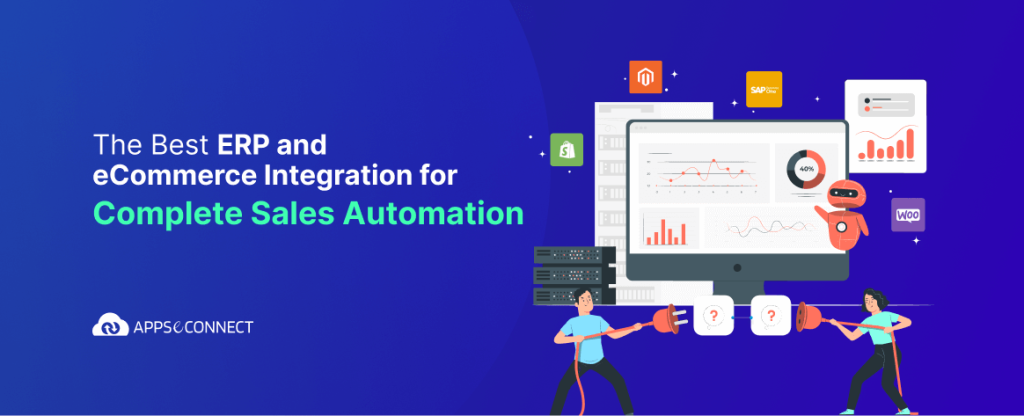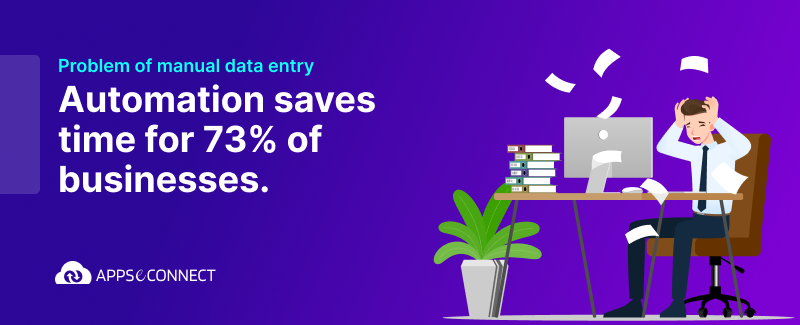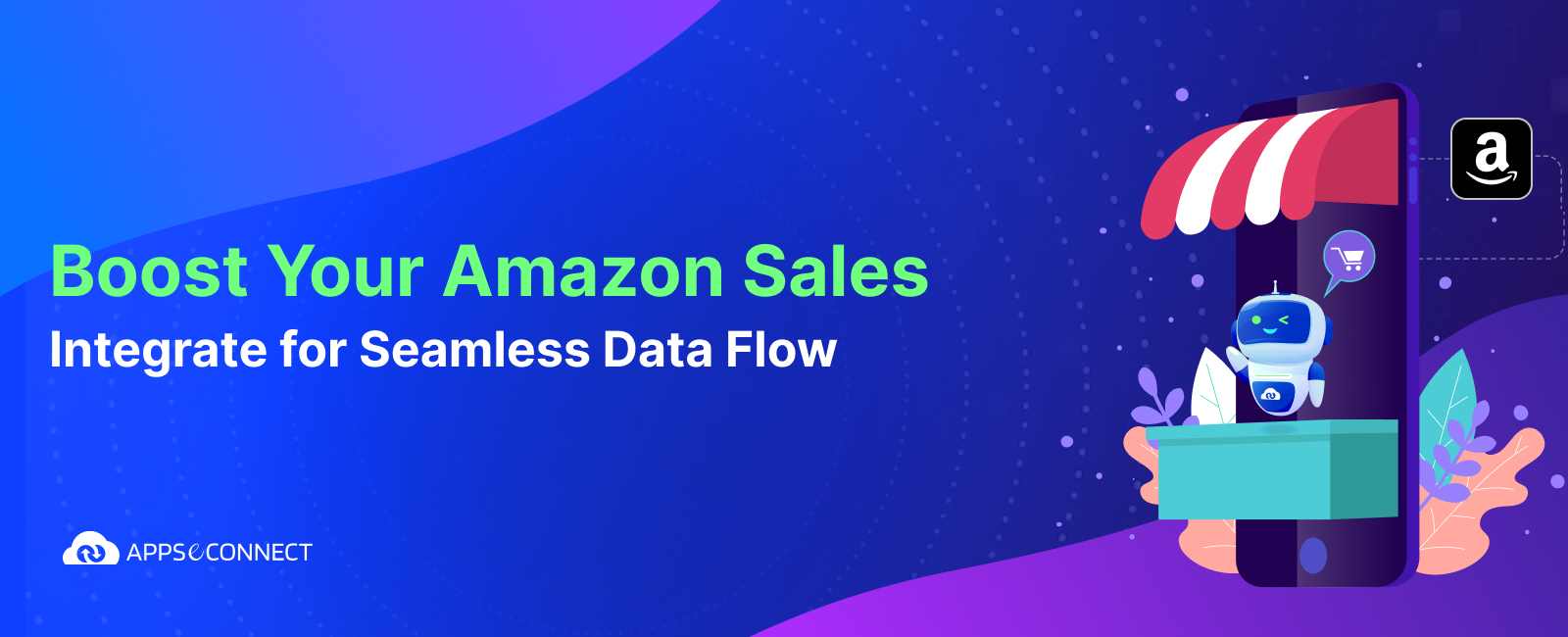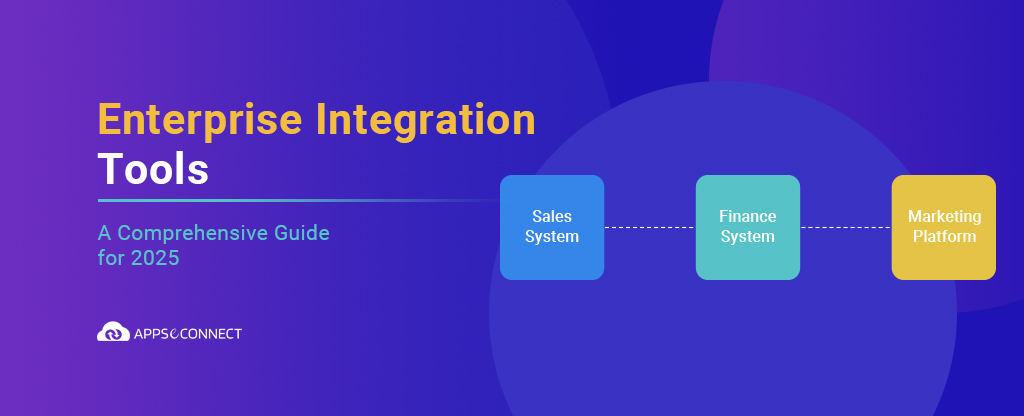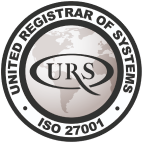To remain competitive and leverage digital technology, eCommerce businesses rely on robust enterprise resource planning (ERP) systems like SAP Business One, SAP S/4HANA, NetSuite, and Microsoft Dynamics 365 Business Central to manage their operations efficiently. But if you’re a fast-growing eCommerce business, having a top-tier ERP system alone isn’t enough. Without powerful ERP and eCommerce integration, you’ll likely run into a host of problems—like data mismatches, manual data entry, and inefficient processes that can slow you down.
The good news? Integrating ERP with eCommerce platform to leverage the full potential of both systems is easier than you think! And the best part is that you can even put your entire sales cycle on autopilot through integrated workflows. How is that possible? Read on to find out.
Why Modern-Day Businesses Need ERP and eCommerce Integration
The eCommerce industry has been growing at a rapid pace, especially in the US.
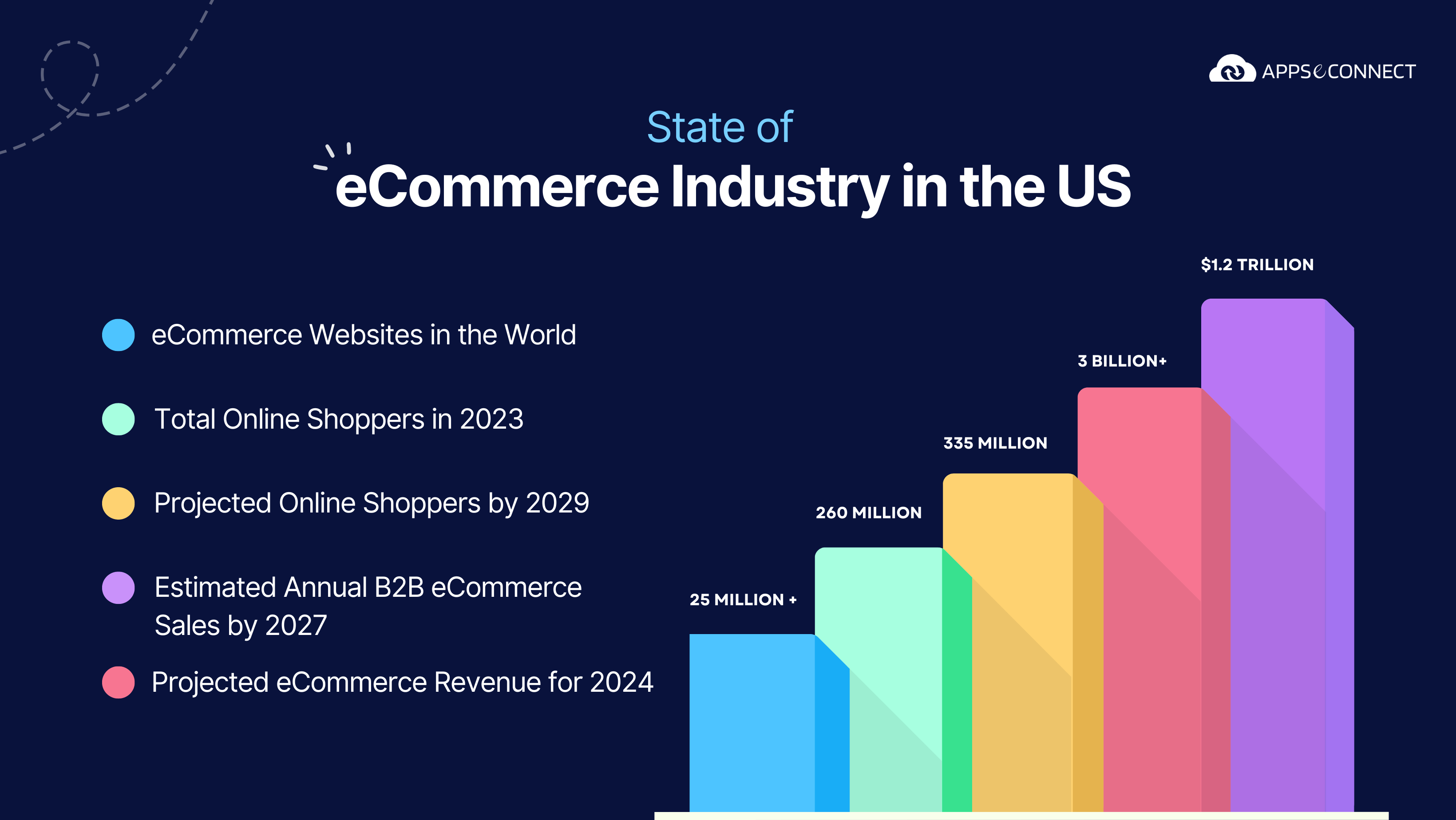
According to the latest statistics, the eCommerce industry is projected to generate a total revenue of 1.2 trillion dollars in the US alone in 2024! There were around 260 million online shoppers in the country in 2023, and that number is predicted to go beyond 330 million by 2029.
These are just a few key figures that highlight how massive this industry is, and how it’s growing continuously and extremely fast.
However, the eCommerce landscape is fiercely competitive as well, as evident by the fact that there are more than 25 million eCommerce websites around the world and the number will keep growing.
Using an ERP system alongside your eCommerce platform is not enough—these systems must work together seamlessly, for which seamless integration becomes essential. For deeper understanding, let’s quickly run through some common but serious challenges and operational bottlenecks that businesses face due to disconnected eCommerce and ERP system.
Common Business Challenges without ERP and eCommerce Integration
When ERP and eCommerce systems operate in silos, it can lead to a range of inefficiencies that can hold your business back.
Manual Data Sync
Manually transferring data between both systems is time-consuming and labor-intensive. Whether it’s updating orders, inventory levels, or customer data, manually syncing data eats up valuable resources that could be better spent on scaling your business.
Error-Prone Data
Human error is inevitable when manual data entry is involved. From mistyped customer addresses to incorrect inventory counts, errors can quickly pile up, leading to costly mistakes like shipping delays, incorrect orders, or even financial reporting discrepancies.
No Transparency
With data stored across two disconnected systems, gaining a unified view of your business becomes a challenge. You’ll struggle to track key performance indicators (KPIs), manage inventory efficiently, or get a clear picture of sales trends, all of which are crucial for making informed business decisions.
Slow Growth
When you’re constantly busy syncing data manually, fixing errors, and dealing with system inefficiencies, there’s little time left to focus on growth. In the fast-paced world of eCommerce, these delays can hinder your ability to scale effectively and stay ahead of competitors.
Inefficiencies in Operations
A lack of integration often means that business processes like order management, inventory updates, and shipping are slower and less efficient. This can lead to bottlenecks, unhappy customers, and wasted resources — all of which prevent you from running an agile and responsive business.
These inefficiencies don’t just slow down your operations—they translate into major business issues that can severely impact your bottom line.
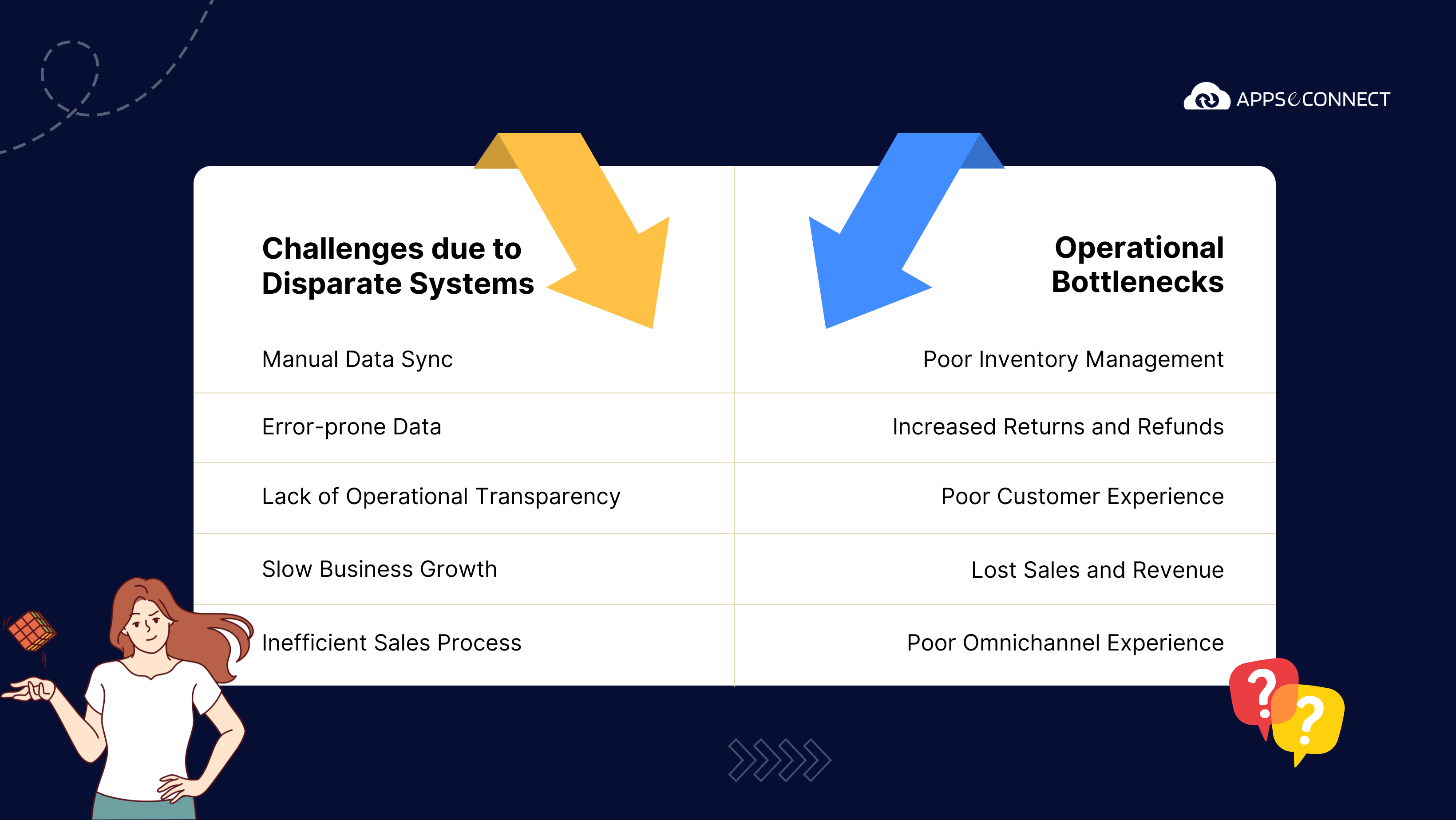
Poor Inventory Management
Without real-time data syncing between systems, inventory management becomes a guessing game. You could easily oversell products that are out of stock or understock popular items, leading to missed sales opportunities and unhappy customers. These inefficiencies ultimately affect your supply chain management as well.
Increased Returns and Refunds
With inaccurate inventory data, delayed order updates, or shipping errors, the likelihood of customers receiving incorrect or delayed orders increases. This results in more returns, refunds, and customer frustration—issues that can harm your brand reputation and drain resources.
Poor Customer Experience
Today’s customers expect fast, accurate service. When your systems aren’t integrated, it can lead to slower order processing, delayed shipments, and inaccurate information on product availability. All of this adds up to a poor customer experience, which can lead to negative reviews and lost loyalty.
Lost Sales and Revenue
Manual processes and inefficiencies don’t just slow things down—they also directly impact your sales. Data errors, inventory mismatches, and delayed responses to customer inquiries can cause you to miss out on potential sales, ultimately resulting in lost revenue.
Difficulty with Omnichannel
As businesses expand into multiple sales channels (online stores, marketplaces, physical locations), managing them becomes even more complex without an integrated system. You’ll struggle to provide a consistent customer experience and manage inventory across channels, limiting your ability to tap into omnichannel opportunities.
By integrating your ERP and eCommerce platform, you won’t just overcome these challenges – you’ll gain a powerful business boost by putting your entire sales cycle on autopilot! Let’s see how.
How ERP and eCommerce Integration Automates Your Complete Sales Cycle
ERP integration with your eCommerce platform allows you to automate the entire sales cycle for both B2C and B2B business, from the moment a customer places an order on your webstore to the final fulfillment.
B2C Sales Cycle Automation with eCommerce ERP Integration
First, let’s consider a typical sales cycle for eCommerce businesses.
When a customer places an order on your webstore, it is captured and stored within the eCommerce platform.
Traditionally, someone would manually transfer this data into the ERP system. They would create a sales order, adjust stock quantities based on the ordered items, change inventory status in the ERP from “in-stock” to “committed,” and finally reduce the inventory count when the order is fulfilled.
Payment details and invoices would also need to be manually entered into the ERP software, while shipping information—like tracking numbers—would have to be updated back in the eCommerce platform.
The problem?
This entire process, for a single order, could easily take 5–10 minutes. You can do the math for any business that deals with 50-100 or even more orders each day – that’s hours of productivity lost week after week, while also considering the payroll expenses for manual data entry staff. You’re losing time and money, day after day!
Further, human errors, like mistyping a customer’s address or entering incorrect order details, can cause major disruptions. These mistakes not only delay order fulfillment but can lead to costly losses—missed deliveries, dissatisfied customers, and ultimately lost sales.
In the fast-paced eCommerce sector, such errors translate into significant revenue loss, damaging both your reputation and your bottom line.
With ERP and eCommerce integrations, however, this entire process is automated. Here’s how it works:
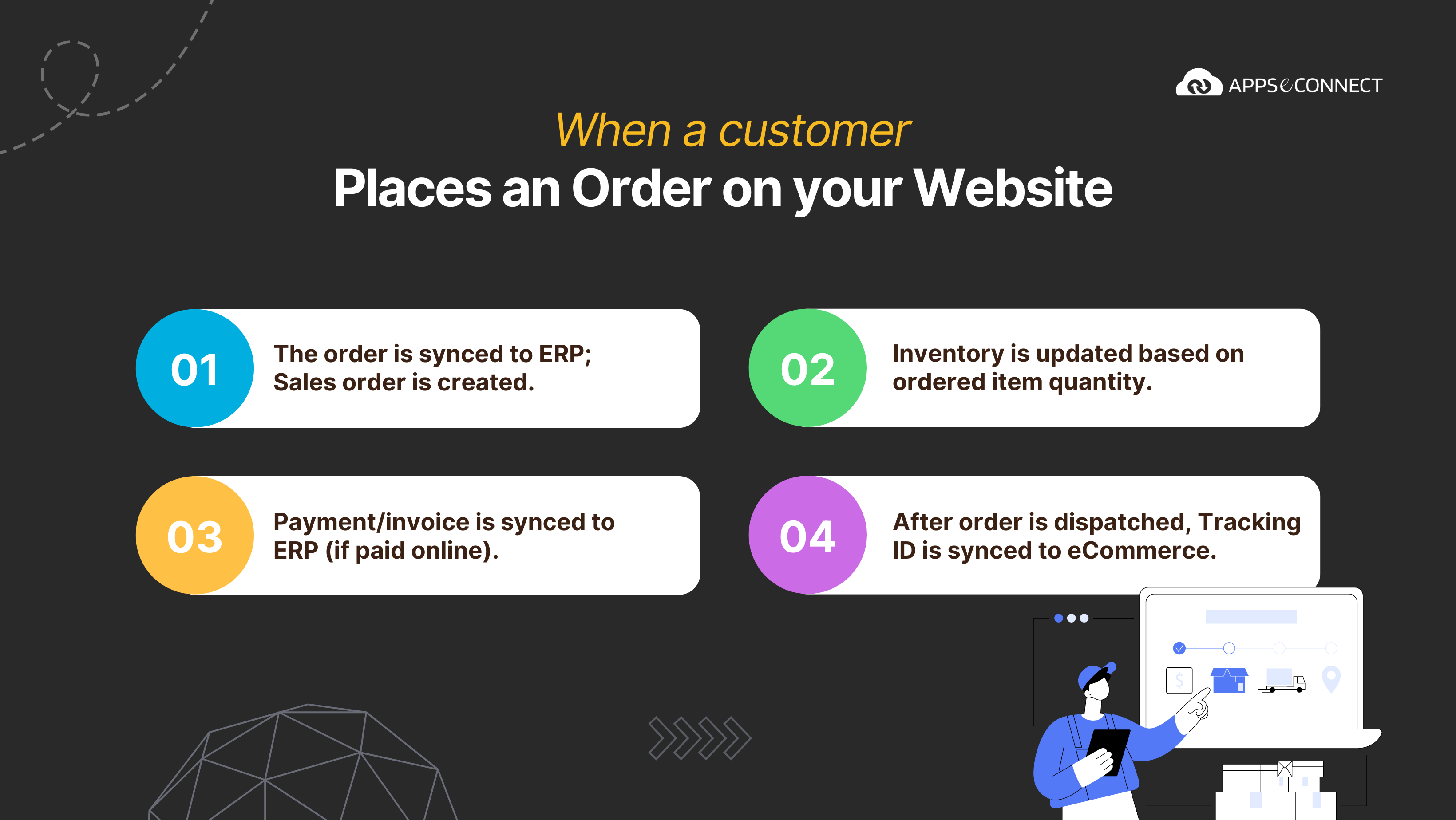
Order Sync
When a customer places an order on your webstore, the order details are instantly pulled from the eCommerce platform and synced as a new sales order in your ERP system. This sales order will include line-item level information such as item/article details, billing and shipping addresses, calculated tax, shipping charges, and any applicable discounts.
This eliminates the need for manual data entry and ensures the sales order is accurate from the start—completely removing the risk of costly human errors.
Inventory Management
As soon as the order is processed, the ERP system automatically adjusts your inventory levels. The stock status in the ERP is updated, and this information is synced with your eCommerce platform so that your online store always reflects accurate, up-to-date stock levels.
Payment and Invoicing
If the customer makes an online payment, those payment details are automatically transferred to the ERP, creating an accurate and immediate financial record. No manual input is required, reducing the chances of errors or delays.
Shipping and Tracking
Once the order is fulfilled, shipping details—such as the tracking number—are synced from the ERP to your eCommerce platform, keeping your customer in the loop with real-time updates on their order.
The entire digital operation—from order placement to fulfillment—is put on autopilot, thanks to the seamless synchronization between your ERP and eCommerce platforms.
B2B Sales Cycle Automation with ERP and eCommerce Integration
For B2B enterprises, sales cycles are often more complicated because of complex business processes, bulk item orders, varying pricing such as customer-specific or tiered prices, etc. And not too long ago, eCommerce wasn’t considered a successful channel in B2B, as offline sales, networking, and nurturing prospects were the key strategies.
While those strategies are still running strong, things have changed in recent years with more B2B companies are finding success through eCommerce channels. According to a 2022 survey report from Mckinsey, 65% of B2B companies were already offering eCommerce capabilities, and it’s safe to say these figures have grown further till date.
So when B2B enterprises have a dedicated webstore powered by an eCommerce platform, once again, ERP and eCommerce integration becomes essential to overcome the challenges of siloed systems. And even with the complex sales cycle, automating key processes is entirely possible.
With an integrated ERP and eCommerce system:
- Business Partners (Company and Contacts) in the ERP system will be synced to eCommerce. Any updates to Business Partners information will also be synced.
- Pricelists managed in ERP will be synced with the eCommerce platform. This is extremely crucial in B2B as prices are often varying, such as tiered-pricing, customer-specific rates, wholesale rates, special discounts, etc. In the webstore, the correct price must be displayed for every customer based on these conditions, which is configured and determined in the ERP. Auto-syncing these pricelists from ERP to eCommerce end means customers always see the accurate pricing that applies to them.
- Payments and invoices will also be auto synced. Invoice created in ERP is synced to the eCommerce, notifying for customer to make online payments. Once paid, the related payment information is also synced back from the eCommerce platform to the ERP system.
Benefits of ERP and eCommerce Integration
Integrating your ERP and eCommerce systems offers numerous advantages that streamline operations, enhance customer experiences, and drive business growth:
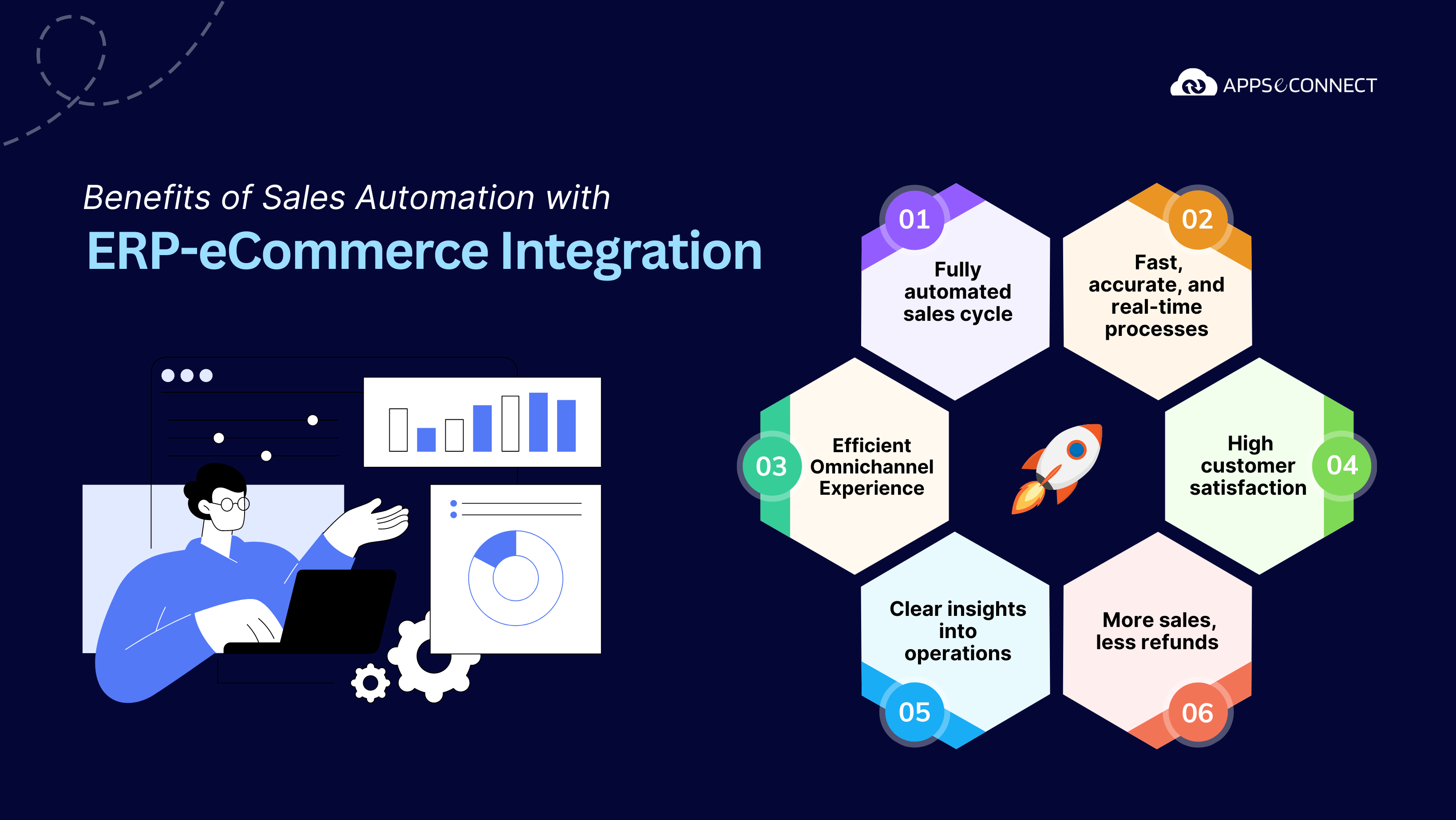
Fully Automated Sales Cycle
Automation eliminates the need for manual data entry and syncs orders, payments, and inventory, enabling a hands-free process from order placement to fulfillment.
Fast, Accurate, and Real-Time Processes
Data updates occur instantly, reducing delays and ensuring that inventory, customer information, and financial records are always accurate.
Efficient Omnichannel Experience
ERP and eCommerce integration helps businesses manage multiple sales channels with ease, ensuring consistent stock availability, pricing, and customer experiences across all platforms.
High Customer Satisfaction
Faster order processing, real-time order tracking, and accurate inventory information improve customer experiences, resulting in higher satisfaction and loyalty.
Clear Insights into Operations
With unified data across platforms, businesses gain a comprehensive view of performance metrics, helping them make informed decisions and identify areas for improvement.
More Sales, Fewer Refunds
Accurate, real-time inventory and order information reduce shipping mistakes and stockouts, leading to more successful sales and fewer costly returns or refunds.
How to Integrate your ERP and eCommerce for Sales Automation?
You’ve seen how ERP and eCommerce integration can automate all important sales processes for both B2B and B2C businesses. How can you achieve the same results for your business?
This level of advanced automation is made possible with APPSeCONNECT’s powerful ERP and eCommerce connectors. Fast, reliable, and real-time ERP integrations are now at the disposal of eCommerce businesses, giving them the boost needed to grow and scale at a faster rate.
APPSeCONNECT is an intelligent integration platform, that connects the best ERP systems with top eCommerce platforms. The best part – our solutions are designed to ‘set and forget’, running as a silent middleware behind the scenes, always keeping your sales cycle on autopilot. To make things better, our team of support experts are also actively working behind the scenes, making sure our integrations are continuously up and running.
Take a look at the best ERP and eCommerce integrations that we offer.
Top ERP and eCommerce Integration
APPSeCONNECT has developed powerful connectors to integrate the best ERP systems such as SAP Business One, SAP S/4HANA, and Business Central with the top eCommerce platforms like Shopify, BigCommerce, WooCommerce, etc.
eCommerce Integration with SAP Business One
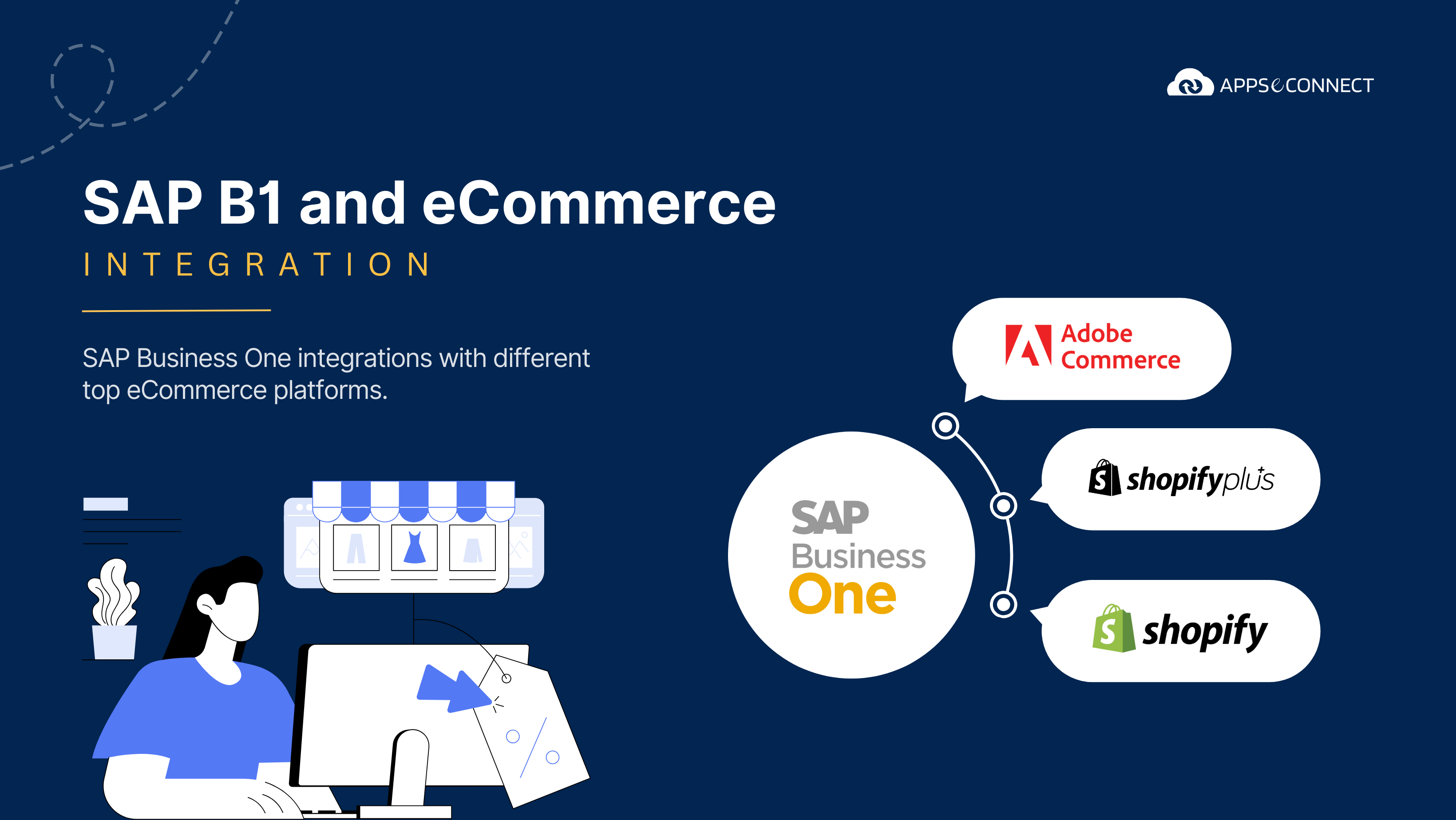
SAP Business One is one of the top ERP solutions specifically designed for growing mid-market businesses. It offers comprehensive business management capabilities, covering everything from accounting and finance to inventory management and customer relationship management (CRM).
For eCommerce businesses looking to scale efficiently, SAP Business One provides the backbone they need to manage operations with precision and control. However, its true potential is unlocked when seamlessly integrated with leading eCommerce platforms.
SAP Business One integrations with eCommerce include:
- SAP Business One and Shopify Connector
- SAP Business One and Shopify Plus (B2B) Connector
- SAP Business One and BigCommerce Connector
- SAP Business One and BigCommerce Enterprise Bundle B2B Connector
- SAP Business One and WooCommerce Connector
- SAP Business One and Adobe Commerce (Magento) Connector
- SAP Business One and Kibo Commerce Connector
eCommerce Integration with SAP S/4HANA
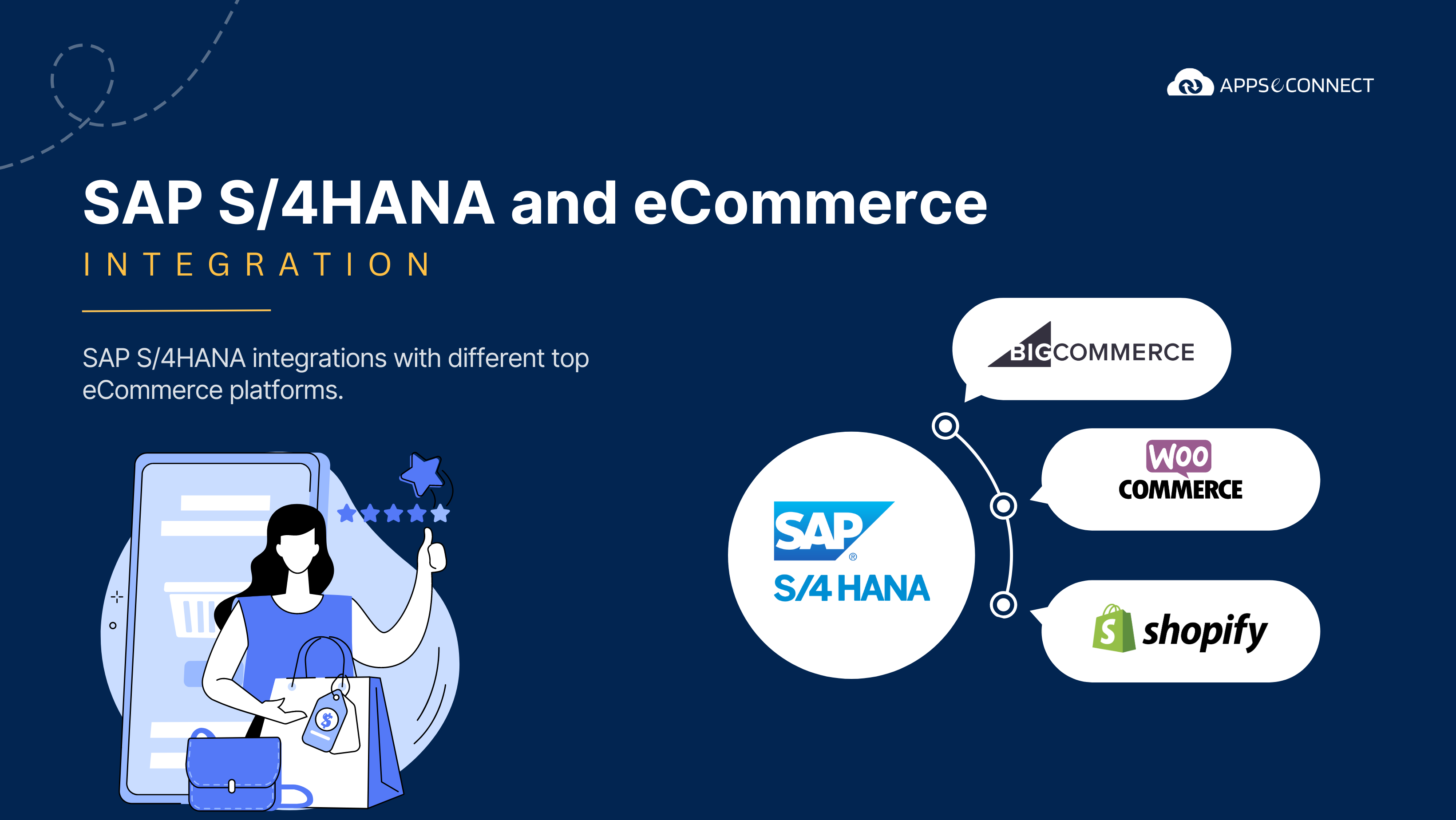
SAP S/4HANA is a next-generation, intelligent ERP solution built to meet the needs of large enterprises and fast-growing businesses. It offers advanced analytics, real-time data processing, and industry-specific capabilities, allowing businesses to streamline operations and make smarter decisions with enhanced visibility. For eCommerce companies, SAP S/4HANA acts as a powerful engine that can handle complex operations.
At APPSeCONNECT, we ensure that SAP S/4HANA connects seamlessly with your eCommerce platform, providing end-to-end automation and real-time synchronization.
SAP S/4HANA integrations with eCommerce include:
- SAP S/4HANA and Shopify Connector
- SAP S/4HANA and BigCommerce Connector
- SAP S/4HANA and WooCommerce Connector
- SAP S/4HANA and Adobe Commerce (Magento) Connector
- SAP S/4HANA and Kibo Commerce Connector
eCommerce Integrations for Microsoft Dynamics 365 Business Central
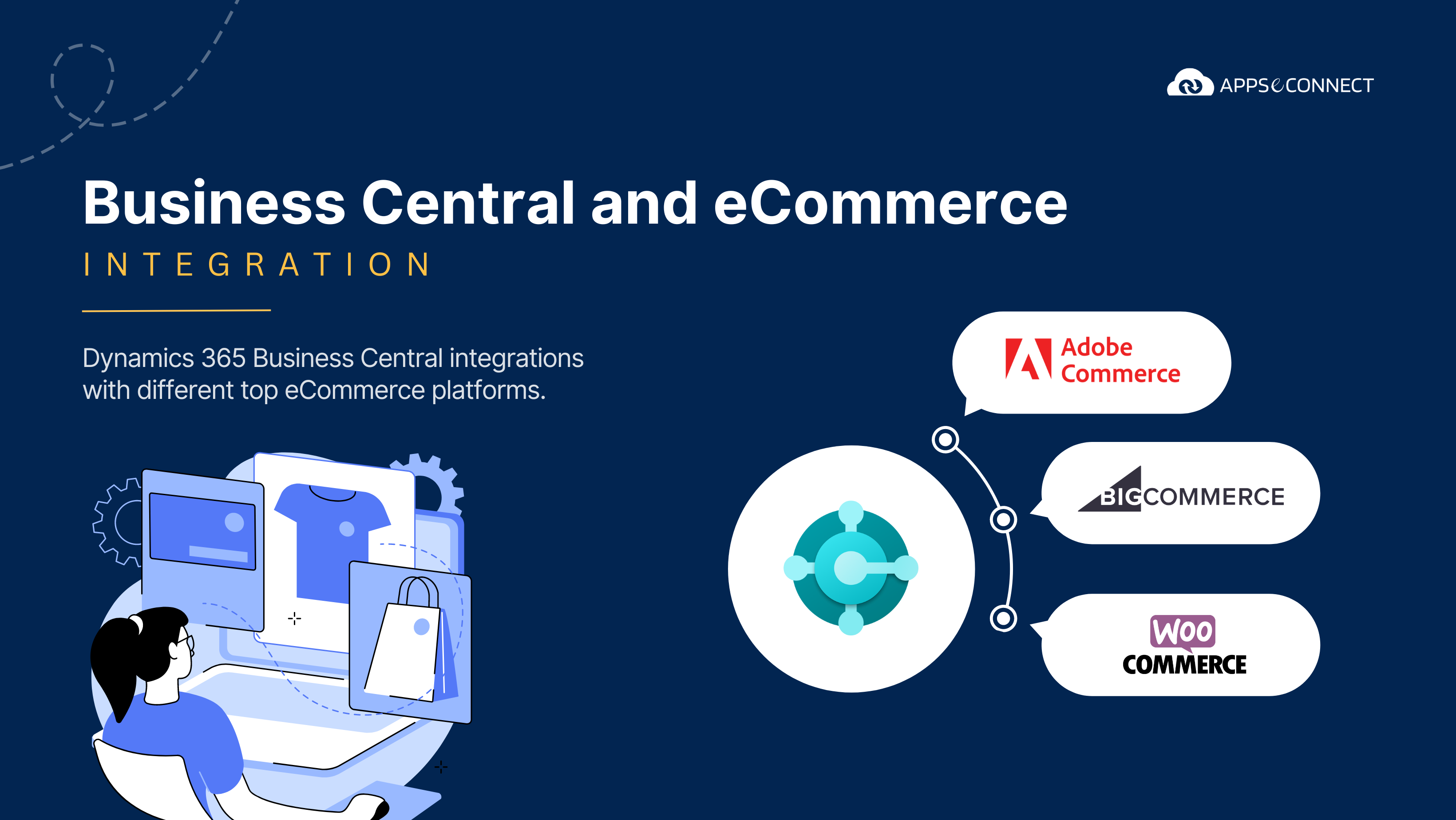
Microsoft Dynamics 365 Business Central is a comprehensive ERP solution designed for small to medium-sized businesses. It offers powerful tools for managing finances, operations, sales, and customer service, helping businesses operate efficiently.
Business Central integrations with eCommerce include:
- Business Central and Shopify Connector
- Business Central and BigCommerce Connector
- Business Central and WooCommerce Connector
- Business Central and Adobe Commerce (Magento) Connector
eCommerce Integrations for NetSuite
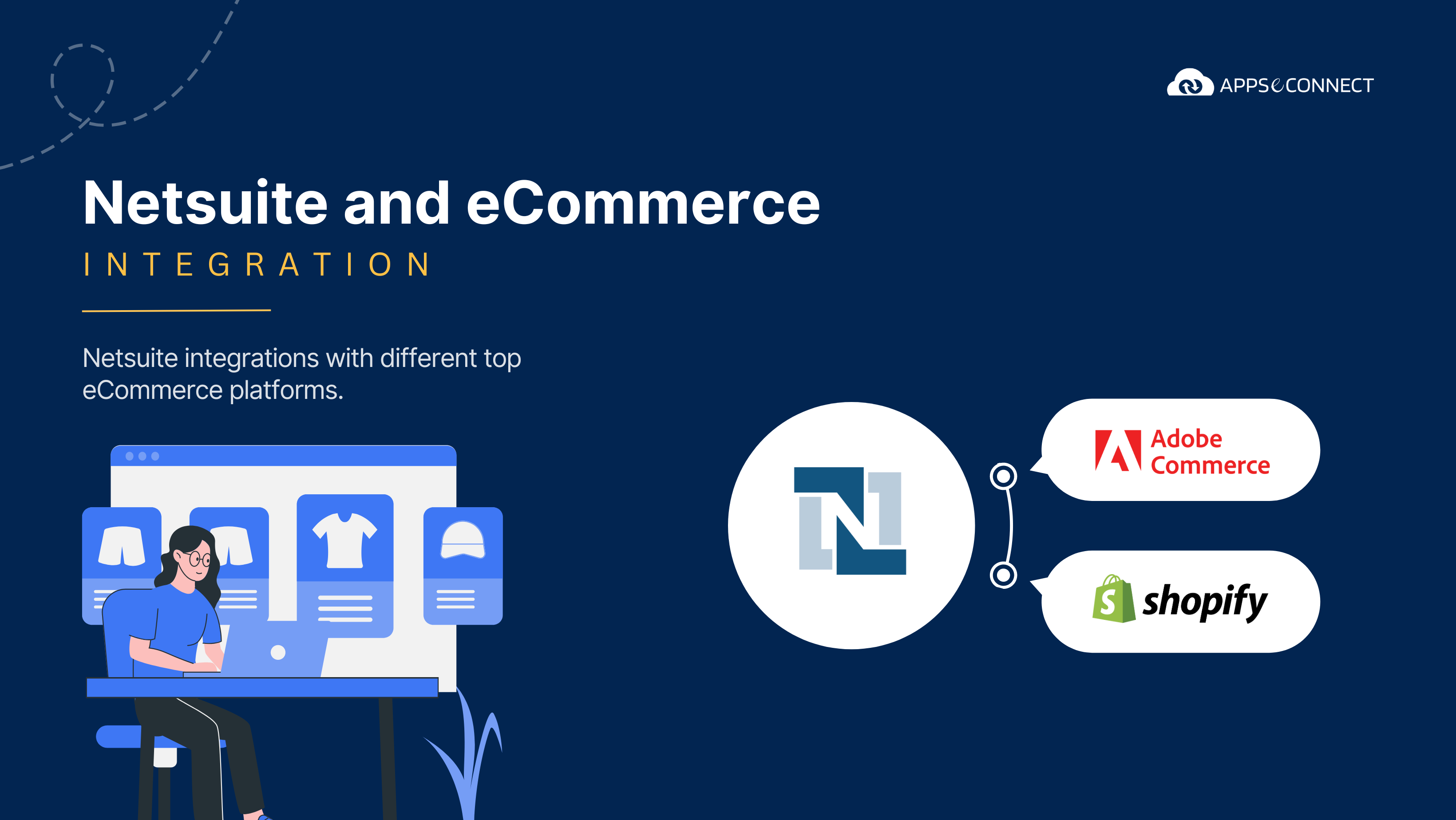
NetSuite is a powerful, cloud-based ERP solution widely adopted by fast-growing businesses and large enterprises. Its comprehensive features span financial management, CRM, supply chain, and inventory management, making it a one-stop solution for managing end-to-end business operations. For eCommerce businesses, integrating NetSuite with leading platforms is essential to ensure real-time data syncing and smooth business processes across all sales channels.
NetSuite integrations with eCommerce include:
eCommerce Integrations for Sage 300
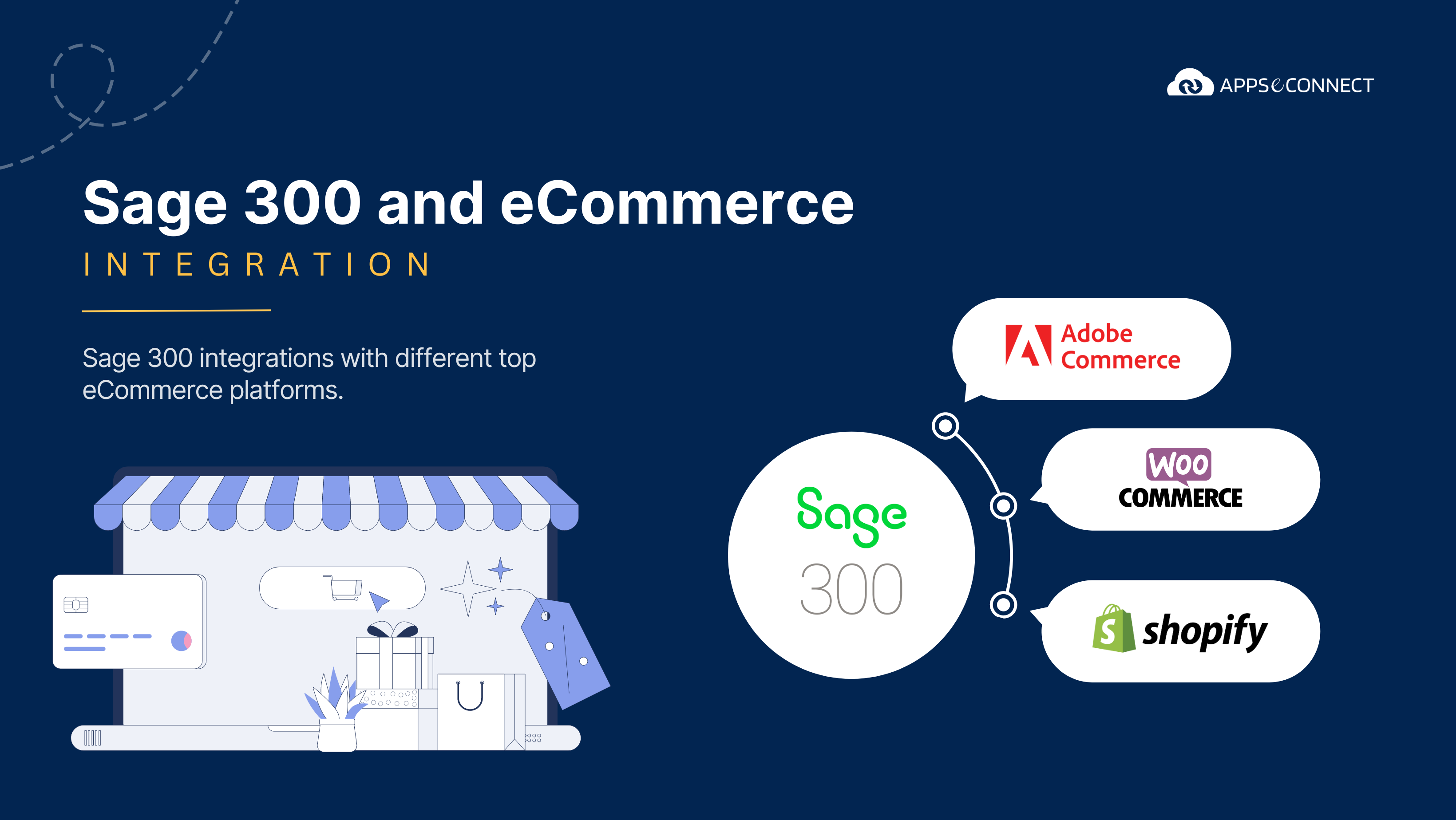
Sage 300 is a robust ERP solution tailored for small to medium-sized businesses, offering a wide range of features to manage financials, operations, and inventory across multiple locations or currencies. It’s particularly favored by businesses looking for strong financial management and operational control. Integrating Sage 300 with top eCommerce platforms enables businesses to streamline operations and ensure real-time data synchronization between their systems.
Sage 300 integrations with eCommerce include:
- Sage 300 and Shopify Connector
- Sage 300 and WooCommerce Connector
- Sage 300 and Adobe Commerce (Magento) Connector
Integrate Your ERP System and eCommerce Platform using APPSeCONNECT
As experts in ERP and eCommerce integration, we offer the most reliable integrations for the best systems. Our solutions are powerful, works passively with little to no human effort, and ultimately puts your entire sales cycle on autopilot.
Seamlessly connect your ERP and eCommerce platform under a single, intelligent, and secure Business Process Automation platform through APPSeCONNECT’s robust integrations and achieve exponential business growth. Take your eCommerce business to the next level. Schedule a demo to see our solution in action. or click below for a free trial of our platform.


